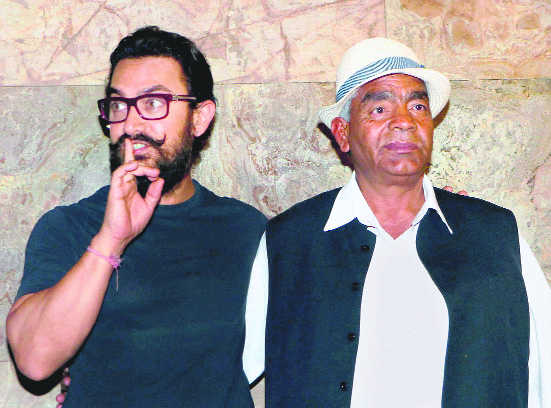Karam Prakash
Chandigarh, December 30
Film critics and audiences at large have expressed great admiration and appreciation for the Aamir Khan-starrer movie Dangal, a biopic on Mahavir Singh Phogat, father of wrestling’s famous Phogat sisters. However, wrestling coaches are disgruntled with the movie — they are upset that certain incidents have been wrongly depicted in the movie.
This raises a few important questions. Why do sports biopics lie? Is it fair to take poetic licence to an extreme degree just to make a movie more dramatic? Should art be allowed to trump facts? Take the case of Bhaag Milkha Bhaag. In the movie, Milkha is shown as a scrawny child in 1947, but in fact he was 17-18 years old at the time of India’s Partition. Then, the Indo-Pak friendship athletics event in Lahore is shown to have taken place after the 1964 Rome Olympics — in fact, the Lahore event had taken place before the 1964 Olympics. The movie also showed Milkha Singh visiting his ancestral village in Pakistan, but the fact is that Milkha has not revisited that village till date.
The less said of Azhar, the biopic on the life of Mohammad Azharuddin, the better, because it turned out to be an effort to rehabilitate Azharuddin, conveniently ignoring/explaining away the sins of his career as a cricketer.
The biopics of Mary Kom and Mahendra Singh Dhoni can’t be accused of taking liberties with facts, though they did overdramatise or romanticise incidents or aspects of their characters.
Why locked up?
In Dangal, Mahavir Phogat is depicted as being locked up in a room on the orders of national coach PR Kadam before the final bout of Geeta in the 2010 New Delhi Commonwealth Games. Kadam’s character is based on then India coach PR Sondhi.
The locking-up never happened, Geeta herself said. “Nothing of this sort happened in reality,” she said. “It is fiction... But it is true that my father was not given any entry pass in the Commonwealth Games and was not allowed on the mat after I won the medal.”
The rule is that only accredited national coaches are allowed to be on the mat.
Mahavir Phogat was definitely not locked up, as Geeta says. This is confirmed in Mahavir’s recent biography, Akhada, according to which he was in the stands during that bout and had indeed seen his daughter win a gold.
Why did Aamir — or Nitish Tiwari, the movie’s director — introduce such a lie in the movie over what seems to be a trivial matter? Perhaps the tough and manly Aamir merely cheering from the stands — and not being involved in ringside strategising — would not have been heroic enough in the view of Aamir and Tiwari. So this lie.
Coach’s role
Another reason the coaches are upset is because the national coach was shown to be the reason behind Geeta’s poor performance at the international level before the Commonwealth Games in 2010. Why this lie? The fact is that Geeta had won gold medals at the Commonwealth Championship in 2009 and 2011 under the same national coach, PR Sondhi.
Former chief national coach OP Yadav, who was with the Phogat sisters for the longest stretch, says that the national coaches had a big role to play in the development of the Phogat sisters. “No one is denying the efforts and sacrifices of Mahavir Phogat at the initial stages,” said Yadav.
“Showing a national coach with untrue events under the genre of biopic, undermining the importance of a national coach and national camp, is misusing cinematic liberty,” he added. “It is only the Long Term Development Program in the national camps which transformed Geeta and Babita into better wrestlers.”
Geeta agrees emphatically: “Yes, of course! National coaches and camps did contribute in my successes and I have learned a lot from national coaches, but I was able to reach the national camp due to my father’s contributions.”
But she has a grievance, too. “During the practice sessions at the national camps my father was not allowed to watch the practice sessions,” she said. “And the coach instructed security personnel not to open the wrestling hall before the coach arrived.”
Sondhi’s view
“Coaching by a personal coach at the national camps is not possible unless he is qualified and part of national coaches’ panel of the Wrestling Federation of India,” said Sondhi. “Some reports say I stopped her father from coming on to the mat in the Commonwealth Games match, but it is not true.”
National camps
The national coaches are upset also because they have worked very hard on the Phogat sisters — for more than 10 years, the Phogat sisters have trained in the national camps under these very coaches.
In all Olympics sports, India’s elite sportspersons train at the national camps. In wrestling, the top four wrestlers in every weight category are trained at these camps by the national coaches. They are given personalised training, as per the standard of the coming international competitions.
“It is the national camp where wrestlers get competitive environment to practise with wrestlers of the same standard to improve their skill and fitness,” said a national coach. “Best possible diet and scientific back-up are provided and remedies are given by scientific experts after diagnosing the weaknesses of a wrestler.”
This is not very appealing in terms of drama — that’s why Aamir/Tiwari chose to focus on a father who turned his daughters into wrestlers, which is infinitely more promising material, infinitely more likely to help a movie earn money.
Unlock Exclusive Insights with The Tribune Premium
Take your experience further with Premium access.
Thought-provoking Opinions, Expert Analysis, In-depth Insights and other Member Only Benefits
Already a Member? Sign In Now











